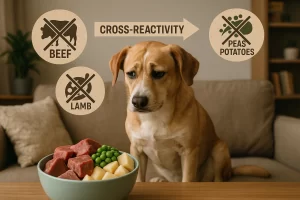As dog owners, we want to provide the best nutrition for our pets, ensuring they live a long, healthy life. Natural ingredients in dog food are often marketed as being the healthiest option, but not all of them are suitable for every dog. For dogs with food allergies, some ingredients that may appear to be healthy can actually trigger allergic reactions or cause discomfort. In this article, we will explore natural ingredients that may seem healthy but are not ideal for dogs with allergies, and why it’s essential to be cautious when selecting your dog’s food.
Understanding Food Allergies in Dogs
Food allergies occur when a dog’s immune system mistakenly identifies certain food ingredients as harmful, triggering an immune response. The body then reacts to these allergens with various symptoms, such as itching, digestive upset, and skin irritations.
While some allergens are well-known, like chicken and beef, other foods that seem healthy—often marketed as “natural”—can also cause allergic reactions in dogs. It’s crucial to read labels carefully and know which ingredients to avoid to maintain your dog’s health.
Natural Ingredients That Can Trigger Allergies in Dogs
Many ingredients in dog food are labeled as “natural” or “healthy,” but some can be problematic for dogs with allergies. Below, we’ll take a closer look at several ingredients that, despite their “natural” appeal, may not be suitable for dogs with food allergies.
1. Sweet Potatoes
Sweet potatoes are often considered a healthy source of carbohydrates, full of vitamins and fiber. While they are safe for most dogs, sweet potatoes can sometimes cause allergic reactions in certain dogs, especially those with sensitivities to high-fiber foods. Common allergic reactions to sweet potatoes may include:
- Gastrointestinal upset (vomiting, diarrhea)
- Itchy skin
- Bloating
If your dog has a food sensitivity or allergy, sweet potatoes should be introduced slowly into their diet, and if any adverse reactions occur, it’s best to avoid them altogether.
2. Peas
Peas are often used as a protein source in grain-free dog foods and are praised for their high fiber and protein content. However, peas can cause problems for dogs with sensitive stomachs or allergies. Dogs allergic to peas may experience:
- Vomiting
- Diarrhea
- Itchy skin
Peas contain lectins, which are proteins that can be difficult for some dogs to digest, potentially causing stomach issues. While peas are generally safe for most dogs, dogs with known sensitivities should avoid them.
3. Carrots
Carrots are often promoted as a healthy treat for dogs due to their low calorie content and high levels of beta-carotene. However, for some dogs with food allergies, carrots can cause a reaction. Symptoms of an allergic reaction to carrots may include:
- Skin rashes
- Itching around the face or paws
- Ear infections
While carrots are generally safe, it’s important to monitor your dog when introducing them to ensure they don’t have any sensitivities.
4. Coconut
Coconut is often considered a superfood for both humans and pets due to its high levels of healthy fats and fiber. However, some dogs may have trouble digesting coconut, especially if they have a sensitivity to fats. In such cases, coconut can lead to:
- Gastrointestinal upset
- Diarrhea
- Stomach cramps
Additionally, coconut oil, which is often marketed as a health supplement, can sometimes trigger allergic reactions in dogs, especially if used in large amounts.
5. Spinach
Spinach is rich in vitamins and minerals, including iron and antioxidants, making it a nutritious addition to a dog’s diet. However, spinach contains oxalates, which can interfere with calcium absorption and lead to kidney stones in sensitive dogs. It can also cause:
- Digestive upset
- Vomiting
- Lethargy
Dogs with a history of kidney problems or those prone to urinary issues should avoid spinach. Even though it’s often labeled as a “superfood,” it’s essential to be cautious about feeding spinach to dogs with allergies or sensitivities.
6. Tomatoes
Tomatoes are another “natural” ingredient that may not be suitable for all dogs, particularly if they are consumed in large quantities or if the dog is allergic. Raw tomatoes and especially green, unripe tomatoes contain solanine, a toxic substance that can cause severe health issues in dogs. Symptoms of solanine toxicity include:
- Vomiting
- Diarrhea
- Lethargy
- Severe abdominal pain
Ripe tomatoes are generally safe in small amounts, but it’s always best to avoid feeding your dog large quantities of tomatoes, especially if they are sensitive to nightshade plants.
7. Alfalfa
Alfalfa is often used as a source of fiber and protein in dog foods and treats. While it may seem like a healthy, natural ingredient, alfalfa can cause allergic reactions in some dogs. Dogs with sensitivities to alfalfa may experience:
- Itchy skin
- Ear infections
- Digestive issues
Because alfalfa can also cause bloating and gas, it’s essential to avoid it in the diets of dogs prone to food sensitivities or allergies.
8. Chia Seeds
Chia seeds are often hailed as a “superfood” due to their high omega-3 fatty acid content. However, for some dogs, chia seeds can cause digestive upset, especially if consumed in large quantities. Chia seeds can expand when they come into contact with liquid, which may lead to:
- Bloating
- Diarrhea
- Gastrointestinal discomfort
While chia seeds are rich in nutrients, they may not be suitable for dogs with sensitive stomachs, especially if they are not properly prepared or introduced gradually.
Why These Ingredients Can Be Problematic for Allergic Dogs
While all of these ingredients are natural and often touted as healthy, they can cause issues for dogs with food allergies or sensitivities. Some of the common reasons these ingredients cause problems include:
- High fiber content: Foods like sweet potatoes, peas, and carrots are high in fiber, which can be difficult for some dogs to digest, leading to gastrointestinal issues.
- Plant compounds: Some ingredients like spinach and tomatoes contain plant compounds (like oxalates and solanine) that can irritate the digestive system or lead to toxicity in dogs.
- Fat content: Ingredients like coconut and chia seeds are high in fats, which may cause gastrointestinal upset in dogs that are not used to consuming large amounts of fat.
- Common allergens: Ingredients like alfalfa and peas may trigger allergic reactions, especially in dogs that are sensitive to certain plant-based proteins or fibers.
Safer Alternatives for Dogs with Food Sensitivities
If your dog has food allergies or sensitivities, it’s important to choose ingredients that are easier on their digestive system and less likely to trigger an allergic reaction. Here are some safer alternatives:
- Pumpkin: Rich in fiber and gentle on the stomach, pumpkin can help with digestion and is a great alternative for dogs with sensitivities.
- Zucchini: Low in calories and easy to digest, zucchini is a healthy option for dogs with food allergies.
- Green beans: Another low-calorie vegetable that is easy on the stomach and often recommended for dogs with food sensitivities.
- Sweet bell peppers: Packed with vitamins and antioxidants, bell peppers are safe for most dogs and less likely to cause allergic reactions.
- Squash: A gentle, easy-to-digest vegetable that provides many of the same nutrients as sweet potatoes but is less likely to cause digestive upset.
Conclusion
While many natural ingredients are healthy and beneficial for dogs, some can cause allergic reactions or digestive problems in dogs with food sensitivities. By understanding which ingredients are best avoided, you can ensure that your dog’s diet is tailored to their specific needs. Always read ingredient labels carefully and introduce new foods gradually to monitor for any adverse reactions. If you’re unsure about which ingredients are safe for your allergic dog, consult with your veterinarian to create a balanced, allergy-friendly diet that supports your dog’s health and well-being.



